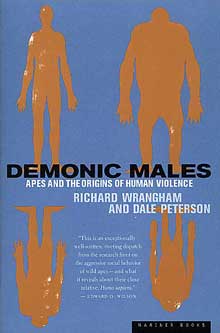
Demonic Males: Apes and the Origins of Human Violence
Co-authored with Richard Wrangham
Boston: Houghton Mifflin, 1996
Demonic Males began as a casual cocktail party chat between myself and my friend Richard Wrangham. Wrangham is the Ruth Moore Professor of Biological Anthropology at Harvard University—a very smart guy who, having originally learned about chimpanzees by working at Jane Goodall’s research site in Tanzania, went on to establish his own study site in Uganda. There are only four major wild chimpanzee research sites in the world; he worked at one, and for many years has run a second. He is certainly one of a tiny handful of top chimpanzee behavior experts in the world, and I recommend this book as an expression of his theoretical brilliance. Much of its logic depends upon a comparison of three very closely related ape species—chimpanzees, bonobos, and humans—and an assessment of why two of them (chimps and humans) are unusually violent, while the third (bonobos) is famously peaceful.
A Publishers Weekly review summarizes the book more fully: “Contradicting the common belief that chimpanzees in the wild are gentle creatures, Harvard anthropologist Wrangham and science writer Peterson have witnessed, since 1971, male African chimpanzees carry out rape, border raids, brutal beatings and warfare among rival territorial gangs. In a startling, beautifully written, riveting, provocative inquiry, they suggest that chimpanzee-like violence preceded and paved the way for human warfare, which would make modern humans the dazed survivors of a continuous, five-million-year habit of lethal aggression. They buttress their thesis with an examination of the ubiquitous rape among orangutans, gorilla infanticide and male-initiated violence and hyenas' territorial feuds, drawing parallels to the lethal raiding among the Yanomamo people of Brazil’s Amazon forests and other so-called primitive tribes, as well as to modern ‘civilized’ mass slaughter. In their analysis, patriotism (‘stripped to its essence… male defense of the community’) breeds aggression, yet, from an evolutionary standpoint, they reject the presumed inevitability of male violence and male dominance over women.”
Demonic Males was designated a Best Book of the Year by the Village Voice, and short-listed for the Winship / PEN New England Award. It has been translated into Chinese, Dutch, German, Italian, Japanese, Korean, Polish, Portuguese, and Spanish.
Reviews And Comments
"The book is an accessible, gripping, sometimes surprising account of the depth and extent of violent behavior among primates as well as a provocative discussion of its origins and possible remedies."—Booklist
"The authors have done an excellent job leading us through a maze of complex issues in a readable and exciting narrative."—Times Literary Supplement
"This is one of the most important books of the decade. Read it, learn, and if you're male, resolve to fight the urges that demean you and others."—Virginian Pilot
"[The book] is a startling, beautifully-written, provocative inquiry."—Publisher's Weekly
"[The book] raises fascinating questions in an accessible style."—The Times
"… a powerful and moving account of the human condition that is as absorbing as it is sobering. It deserves a wide audience."—Kirkus Reviews
Demonic Males: Apes and the Origins of Human Violence by Dale Peterson
| BUY THE BOOK | ||||||
|
|
||||||
Chimps vs. Humans: How Similar Are We? »From the show: The Dr. Decker Weiss Show. Original Air Date December 16, 2013. It is a scientifically accepted fact that humans evolved from a common ancestor with chimpanzees, but our similarities and differences are not what many people think. Animal science expert Dale Peterson, PhD, explores the genetic link between the two species and explains the similarities and differences. |




